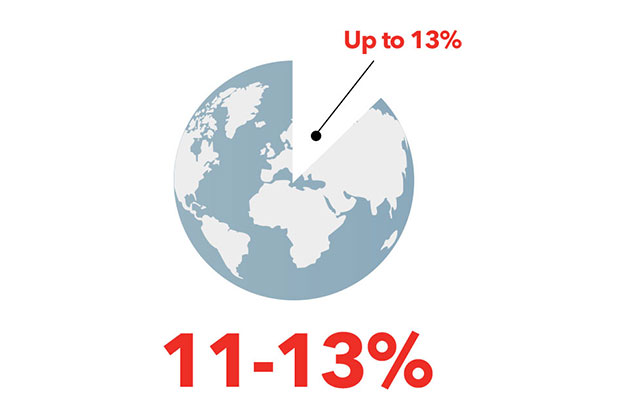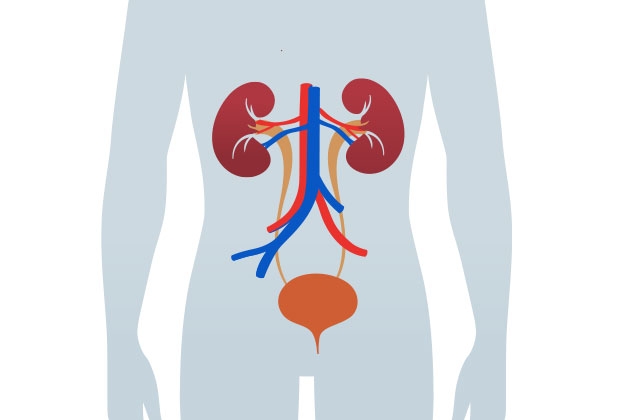CKD is a global health issue1
Chronic kidney disease (CKD) affects up to 13% of the global population.1 Being diagnosed with kidney disease can be a huge challenge, both for the patient and those people around them. Its diagnosis and management, particularly in advanced stages of kidney disease, can impact severely upon their physical and mental state.4

Global prevalence of CKD by stage
As shown in the graph, the estimated global CKD prevalence is between 11 and 13% with the majority of patients in stage 3.1 These results are in accordance with a more recent study by Obrador published in 2019.5

Understanding CKD - Kidney basics

You have two kidneys, each about the size of an adult fist, located on either side of the spine just below the rib cage. Although they are small, your kidneys perform many complex and vital functions that keep the rest of the body in balance, including elimination of wastes, regulation of blood composition, blood volume and blood pressure, as well as mineral homeostasis. When the kidneys are damaged or diseased, they can abruptly or progressively lose their ability to perform these vital functions. This results in waste and fluid build-up and abnormal hormonal regulation of blood pressure and mineral homeostasis.
The kidneys regulate:2

Waste elimination

Blood composition

Blood volume

Blood pressure

Mineral homeostasis
Definition of chronic kidney disease3
Chronic kidney disease describes the gradual loss of kidney function. According to the KDIGO 2017 Clinical Practice Guideline, CKD is defined as abnormalities of kidney structure or function, present for more than 3 months, with implications for health. Chronic kidney disease includes conditions that damage your kidneys and decrease their ability to keep you healthy. If kidney disease gets worse, wastes can build to high levels in your blood and make you feel sick. You may develop complications like high blood pressure, anemia (low blood count), weak bones, poor nutritional health and nerve damage. Also, kidney disease increases your risk of having heart and blood vessel disease.
Stages of CKD
based on glomerular filtration rate (GFR)3
The KDIGO 2017 Clinical Practice Guideline suggests the classification of chronic kidney disease into five stages, based on glomerular filtration rate (or GFR), which is one of the measures of kidney function that describes the flow rate of filtered fluid through the kidney. This measure tells you how much kidney function you have. As kidney disease gets worse, the GFR number goes down.

Talk to your doctor
If you have been diagnosed with CKD it is likely that you will have regular follow up appointments with your doctor to check how you are feeling and to monitor the progress of your symptoms. If you have been feeling fatigued or think you may have any of the symptoms of iron deficiency such as paleness, faintness or a racing heart, you may want to speak to your doctor about your symptoms. To get the most out of your visit, think in advance about the information that the doctor might need in order to work out what is causing your symptoms. You should also prepare any questions that you want to ask.
HQ-NA-2100201. Date of preparation September 2021
- Hill NR, et al. PLoS One. 2016;11(7):e0158765
- https://www.kidney.org/kidneydisease/howkidneyswrk date of access August 2020
- Levey AS, et al. Kidney Int. 2005;67(6):2089-2100
- Kefale B, Alebachew M, Tadesse Y, Engidawork E (2019) Quality of life and its predictors among patients with chronic kidney disease: A hospital-based cross sectional study.PLoS ONE 14(2): e0212184.
- Obrador GT. Epidemiology of chronic kidney disease. UpToDate. 2019
Se lhe foi diagnosticada doença renal crónica, geralmente conhecida por DRC, tem maior probabilidade de sofrer de anemia. A deficiência de ferro pode ser uma causa desta anemia.
Um dos principais sintomas da deficiência de ferro é a fadiga, uma versão mais extrema do cansaço. Se estiver com fadiga, pode sentir-se física e mentalmente exausto, mesmo que não tenha feito nenhuma atividade física particularmente exigente.
Se lhe foi diagnosticada DRC, é provável que venha a ter consultas regulares com o seu médico para avaliar como se sente e acompanhar a progressão dos sintomas. Se tem sentido fadiga ou manifesta algum sintoma de deficiência de ferro, como palidez, fraqueza ou batimento cardíaco acelerado, deverá marcar uma nova consulta ou falar destes sintomas com o seu médico na próxima consulta que tiver agendada. Para tirar o maior partido da consulta, prepare antecipadamente as informações que o médico poderá requerer para determinar a causa dos sintomas, bem como as perguntas que lhe quiser fazer.
Assim que o seu médico tiver testado os seus níveis de ferro, poderá decidir qual o melhor tratamento para si, dependendo do nível de deficiência de ferro que tiver. Poderá então orientá-lo na introdução de mais ferro na sua alimentação e/ou recomendar-lhe uma medicação que melhore os seus níveis de ferro.
Se lhe foi diagnosticada doença renal crónica, geralmente conhecida por DRC, tem maior probabilidade de sofrer de anemia. A deficiência de ferro pode ser uma causa desta anemia.
Um dos principais sintomas da deficiência de ferro é a fadiga, uma versão mais extrema do cansaço. Se estiver com fadiga, pode sentir-se física e mentalmente exausto, mesmo que não tenha feito nenhuma atividade física particularmente exigente.
Se lhe foi diagnosticada DRC, é provável que venha a ter consultas regulares com o seu médico para avaliar como se sente e acompanhar a progressão dos sintomas. Se tem sentido fadiga ou manifesta algum sintoma de deficiência de ferro, como palidez, fraqueza ou batimento cardíaco acelerado, deverá marcar uma nova consulta ou falar destes sintomas com o seu médico na próxima consulta que tiver agendada. Para tirar o maior partido da consulta, prepare antecipadamente as informações que o médico poderá requerer para determinar a causa dos sintomas, bem como as perguntas que lhe quiser fazer.
Assim que o seu médico tiver testado os seus níveis de ferro, poderá decidir qual o melhor tratamento para si, dependendo do nível de deficiência de ferro que tiver. Poderá então orientá-lo na introdução de mais ferro na sua alimentação e/ou recomendar-lhe uma medicação que melhore os seus níveis de ferro.




